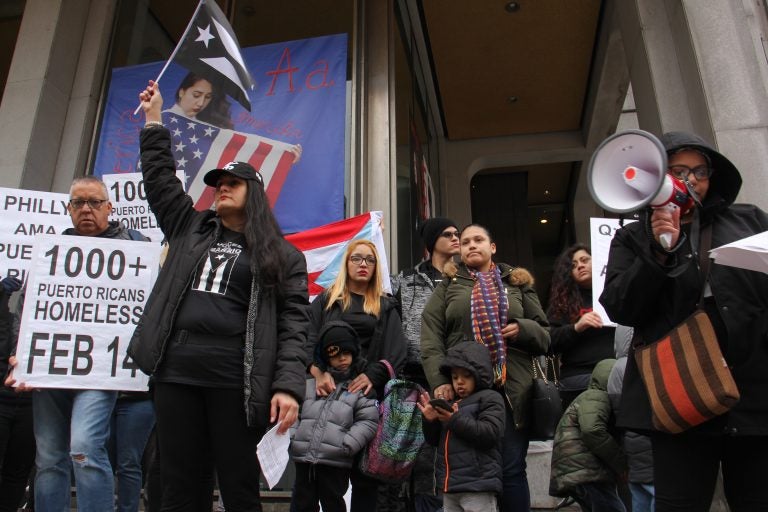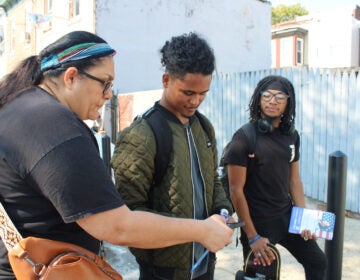A new group promises long-term support for Puerto Rican hurricane evacuees
This is a first step towards creating the long-term recovery strategy that city officials and community advocates have struggled to create in the five months since the storm.

Activists call for more support for Puerto Ricans displaced by Hurricane Maria during a rally at Thomas Paine Plaza. They are joined by Carlos Torres (left), Muriel Rivera and her son, Yeriel, 6, (center left), and Melanie Garcia and her three children (center right), who all face eviction. (Emma Lee/WHYY)
Philadelphia disaster relief organizations have established a new committee designed to help the city support the more than 900 Puerto Rican families who landed here after losing their homes, schools, and jobs in the winds of Hurricane Maria. The move is a first step towards creating the long-term recovery strategy that city officials and community advocates have struggled to create in the five months since the storm caused upwards of $9 billion in damages and displaced hundreds of thousands of U.S. citizens.
Now getting off the ground, the Greater Philadelphia Long Term Recovery Committee will provide disaster evacuees in Philadelphia and its surrounding boroughs a centralized place for services, something needed since Philadelphia Office of Emergency Management’s disaster center closed last December.
The group will be hosted by the local chapter of the National Voluntary Organizations in Disaster (NVOAD), a coalition that assists communities affected by disasters. Julia Menzo, coordinator of disaster preparedness and recovery for Liberty Lutheran and Southeastern Pennsylvania VOAD co-chair, said the committee will gather information from organizations that have been working with evacuees and assign families a case manager to document and digitalize their needs. The case manager’s job will be following up with evacuee families over the longer term as they settle into the city, return home or go elsewhere.
The group still doesn’t know exactly how many Puerto Rican evacuee families are staying in Philadelphia, but as of the last count in December, 875 families had visited OEM’s disaster center, and 380 displaced students had entered the Philadelphia School district.
“By having a way to looking at all the most urgent cases at the same time, we can make some determinations about priorities and then equitably distribute to them,” Menzo said.
Another goal of the new committee is coordinating efforts across local and federal agencies and organizations.
“Recovery is a collective response, from government agencies through community and faith-based organizations,” Noëlle Foizen, deputy director of Philadelphia OEM, said in an email. “Long-term recovery groups bring together all these resources to share information, pool resources, identify possible problems as well as solutions, all with the goal of getting the disaster survivor back on their feet.”
If federal funds are available to the evacuees, agencies in the long-term recovery committee can assist them in locating and securing the resources, Foizen said.
She described the city’s post-Maria struggles as a learning experience that will prove useful in a world of increasingly extreme weather.
“As the United States sees more natural disasters, we, as a region, need to be thoughtful of disasters that hit home, but also afar,” Foizen said. “Hurricane Maria was a new experience for the city. Just as other responses, we look to learn and improve to prepare for the next event.”
VOAD is not new to the region. It’s operated in Philadelphia, Montgomery, Bucks, Delaware and Chester for the past 10 years yet this is the first time it is responding to a disaster that happened outside of the region, and the first time its created a long-term recovery group locally. Menzo, too, expects this won’t be the last time VOAD finds itself in this position.
“The volatility of the world seems to be increasing, so I don’t see an end for the need to respond to unique situations anytime soon,” Menzo said.
Last Friday, Puerto Rican Governor Ricardo Rosselló promised to contact Governor Tom Wolf and FEMA to declare Pennsylvania as a host state and get federal funds for housing for evacuees staying in Philadelphia. A FEMA spokesperson said that the agency has not received a formal request or notification of a host state agreement between Puerto Rico and Pennsylvania.
“So we have to move on,” said Will González, the executive director of Ceiba, a nonprofit that is part of the new committee. “The long-term recovery group will provide access to some national nongovernmental resources in a time when there’s a growing need.”
About 2,500 Puerto Rican families moved to Pennsylvania after Hurricane Maria, according to FEMA. The Greater Philadelphia Long Term Recovery Committee Continues estimates the number will grow to 56,000 by the end of the year, and that about 50 percent of them will be in Philadelphia.
Those still staying in city hotels paid by FEMA’s Temporary Shelter Assistance (TSA) program have less than a month to find funds to pay the three months of rent needed to move to a new place. And those staying with friends and family, sometimes in sofas or in mattresses on the floor, won’t be able to stretch the love a lot longer.
“We have families living in one-bedroom apartment where there are six, seven, eight people in the same room, and places where three families are living in the same apartment,” said Reverend Robertoluis Lugo, director of intervention and prevention development at Asociación Puertorriqueños en Marcha (APM). “They don’t have privacy, they’re on top of each other… it’s too much pressure. They’ll be kicked out in any minute.”
Puerto Rican evacuees can seek help at Catholic Social Services’ Casa del Carmen or APM in North Philadelphia. Other agencies participating are Ceiba, Lutheran Disaster Response, Salvation Army, Philadelphia Office of Emergency Management, United Church of Christ Disaster Services (UCC), and American Red Cross.
WHYY is your source for fact-based, in-depth journalism and information. As a nonprofit organization, we rely on financial support from readers like you. Please give today.







